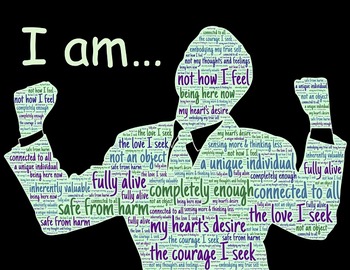Can a Poor Self-Image be Improved?
Self-image – your blueprint for success!
It’s all very well starting out on a fitness program, but unless you’re mentally prepared you might not meet with the success you deserve. Training hard, and sticking to what you’re aiming for is excellent, but all too often one of the main factors in seeking achievement of any kind is ignored. Or worse still, not even understood. I’m talking about the way you see yourself – your self-image.
The self-image isn’t just an imaginary view of yourself, like a snapshot you carry round in your head. It’s way more than that; more even than a three-dimensional image of yourself, and more like a living, breathing hologram of some futuristic kind. It’s imbued with all your likes and dislikes, your beliefs and mannerisms, your attitudes, your idiosyncracies, all the little things that go together to personify the real you. And it’s built up over years and years, a lifetime in fact. So, as I say, it’s way more than just a mental passport photo.
Everything adds to your self-image … positively or negatively
 Your self-image is built up bit by bit, infinitely gradually, and it’s created by your thoughts and feelings about yourself. Every time you do something successful and have positive thoughts and feelings about yourself, they add to your self-image. They build it up and make it stronger and more robust. And every time you fail at something, or miss an opportunity, or shirk a responsibility, or make a catastrophically bad decision, it results in a weakening of your self-image. It becomes less attractive and less appealing, and more flawed.
Your self-image is built up bit by bit, infinitely gradually, and it’s created by your thoughts and feelings about yourself. Every time you do something successful and have positive thoughts and feelings about yourself, they add to your self-image. They build it up and make it stronger and more robust. And every time you fail at something, or miss an opportunity, or shirk a responsibility, or make a catastrophically bad decision, it results in a weakening of your self-image. It becomes less attractive and less appealing, and more flawed.
But there’s more to it than just how attractive it is. Your self-image isn’t just a mental image of yourself, no matter how detailed – it’s more of a mental blueprint. It’s a plan of who you are, a design, a set of parameters that describes you and how you will react or perform in any given situation. And the reason it has any effect on the way you behave is that your subconscious mind uses it as a template to know who you really are.
 The idea of the self-image was popularised in the ’60s by Dr. Maxwell Maltz in his brilliant and wildly successful book, Psycho Cybernetics. In it he discusses how we all create our own self-image, bit by bit, over a lifetime, and how it can be consciously changed by a program of mental rehearsal.
The idea of the self-image was popularised in the ’60s by Dr. Maxwell Maltz in his brilliant and wildly successful book, Psycho Cybernetics. In it he discusses how we all create our own self-image, bit by bit, over a lifetime, and how it can be consciously changed by a program of mental rehearsal.
The book has never been out of print and has sold somewhere between 30 and 50 million copies worldwide. It’s hard to imagine how many lives have been positively influenced by this book, but its impact is not showing any signs of abating. In fact, its popularity is growing all the time, as more and more people learn its lessons and spread the word of how amazing the book really is.
Your subconscious refers to your self-image blueprint
Any time you’re faced with a difficult situation, your subconscious mind goes back to the drawing board and takes a quick look at the mental blueprint it keeps of you, so that it knows how to help you act. And it always sees to it that you act in line with your self-image, because that’s the only thing it has to go on. It really is, in effect, the blueprint for the way you will act or behave in any situation.
In other words, if you find yourself in a situation where you have to speak in public, your subconscious refers to your self-image before you even open your mouth. And if it sees from your ‘blueprint’ that you are a capable public speaker then you will easily take on the role that you’ve just found yourself in. You’ll have no difficulty in addressing an audience, and you’ll do it comfortably, and you might even do it with an easy and professional touch.
But if your blueprint dictates that you are terrified of public speaking, your subconscious will see to it that you are jittery and hesitant, easily embarrassed, tongue-tied, and prone to make a mess of the whole thing. It won’t just let you do that, it will actively help you do it. Because that’s it’s job! It can only direct you to act in a way that is congruent with your self-image, and nothing else.
Your self-image dictates your performance
 If you’ve built up a self-image of yourself that includes you being hopeless at sports, then your subconscious will do all it can to keep to those guidelines – and you’ll be hopeless at whatever sport you attempt. If you’ve built up a self-image that includes confidence in face-to-face situations, even those that could end in violence, you’ll feel confident and competent in such situations and you’ll be able to handle them comfortably and in such a way that violence is usually avoided. But even if it can’t be, you’ll act confidently and with the feeling that you’re in control of the situation.
If you’ve built up a self-image of yourself that includes you being hopeless at sports, then your subconscious will do all it can to keep to those guidelines – and you’ll be hopeless at whatever sport you attempt. If you’ve built up a self-image that includes confidence in face-to-face situations, even those that could end in violence, you’ll feel confident and competent in such situations and you’ll be able to handle them comfortably and in such a way that violence is usually avoided. But even if it can’t be, you’ll act confidently and with the feeling that you’re in control of the situation.
This might seem like really bad news, in one respect. You’re effectively at the mercy of your self-image, and there’s absolutely no way you can act except in line with its dictates. While that’s true, it’s not nearly as hopeless as you might imagine. In fact, the reality is that the self-image can be changed consciously as well as by default. In other words, if you make an effort to see yourself in a certain light you can change your self-image to suit yourself.
You can create a better self-image!
 You have it in your power to manipulate your self-image. And it’s not a very complicated thing to achieve. All that’s called for is a bit of mental rehearsal. If you can put yourself mentally in situations that would otherwise be challenging, and see yourself dealing with them successfully, you’ll be improving your self-image and, in effect, training your subconscious to work in your favour, instead of against you.
You have it in your power to manipulate your self-image. And it’s not a very complicated thing to achieve. All that’s called for is a bit of mental rehearsal. If you can put yourself mentally in situations that would otherwise be challenging, and see yourself dealing with them successfully, you’ll be improving your self-image and, in effect, training your subconscious to work in your favour, instead of against you.
All you have to do is get comfortable, sit down and close your eyes (or lie down, if that suits you better), and lull yourself into a deeply relaxed state. Then imagine yourself in the particular situation that might be giving you trouble, like, for example, public speaking, or dealing with an upcoming confrontation. And because you’re doing this consciously you can make sure this imaginary ‘you’ handles the situation really well. It really is within your power to determine exactly how this hypothetical version of you acts in any given situation. And the reason this works so well is that the brain is literally incapable of telling a vividly imagined scenario from a real one.
You can see yourself handling an awkward confrontation, for example, and bringing it to a successful conclusion by reasoning and gentle persuasion, rather than resorting to arguing and letting it get completely out of hand. Or you can see yourself taking part in a sport and actually enjoying it, and being relaxed and confident about the whole experience. And the key thing is to not just see yourself in these situations, but to feel the emotions that go along with your new way of acting.
The key is getting your imaginary self to feel the way you want to
 Feel the confidence you crave in a face-to-face encounter, or feel the enjoyment of playing the sport, or feel in command of an audience, or feel relaxed about being in a confined space. You can literally change the way your subconscious mind sees yourself by this mental rehearsal, and if you do it from time to time, or more often and more regularly if you feel that’s necessary, you can pretty soon experience a definite change in the way you’re acting in those situations that you used to find so difficult.
Feel the confidence you crave in a face-to-face encounter, or feel the enjoyment of playing the sport, or feel in command of an audience, or feel relaxed about being in a confined space. You can literally change the way your subconscious mind sees yourself by this mental rehearsal, and if you do it from time to time, or more often and more regularly if you feel that’s necessary, you can pretty soon experience a definite change in the way you’re acting in those situations that you used to find so difficult.
It’s well worth taking time to examine your self-image and trying to see what false beliefs you’re carrying around about yourself. You might have built up a faulty self-image because you made a mess of speaking in front of the class when you were twelve years old, for example, and once you realise that you can do something positive about it. You can create a more confident version of yourself in your mind, one who is comfortable speaking to a group and doesn’t fear the situation or react badly to suddenly finding yourself right in the middle of it.
Work on improving your self-image any way you choose
This is valuable knowledge to have available. You might be apprehensive about the training you’re about to embark on, for example, and so you can spend a few minutes each day mentally rehearsing how well you’ll be able to cope with it. You can see yourself performing exercises with strict form, and forcing yourself through the pain barrier, and actually enjoying the experience. You can feel invigorated by it, and aware that it’s successfully impacting your physical appearance and improving your health.
And you can apply this to anything, to whatever is causing you a problem. You can be as confident as you decide to be, or as capable, in any situation. All you have to do is spend a few minutes a day experiencing the new, confident, capable you, and you’re well on your way to dealing with life successfully, instead of being at the mercy of a poor self-image

